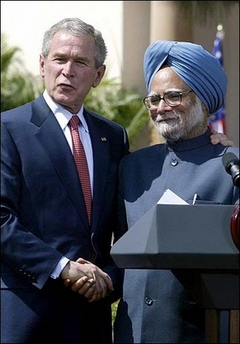Asia-Pacific
US-Indian nuke deal finalized in Congress
(AFP)
Updated: 2006-12-08 14:02
 |
Large Medium Small |
WASHINGTON () - The US Congress completed final legislation for a landmark civilian nuclear deal with India, removing contentious provisions objected by the US and Indian governments.
The legislation reconciled separate bills passed by the Senate and the House of Representatives aimed at implementing a nuclear agreement reached between Indian Prime Minister Manmohan Singh and US President George W. Bush last year.
It is expected to be passed by the House and Senate on Friday before Bush signs it into law.
Lawmakers said key provisions objected by the administrations of Bush and Singh were "watered down," including one that initially virtually compelled India to back US efforts to contain New Delhi's traditional ally Iran's nuclear program.
"This latest step in a long and sometimes arduous legislative process has resulted in a satisfying consensus," said Tom Lantos, the incoming head of the powerful House international affairs panel.
The final legislation "strikes the right balance between giving the President the necessary flexibility to negotiate the best agreement possible with New Delhi, while at the same time preserving Congressional oversight," he said.
Under the deal, India, a non-signatory of the nuclear Non-Proliferation Treaty (NPT), will be given access to civilian nuclear technology in return for placing its atomic reactors under global safeguards.
The pact was seen as controversial because the US Congress had to create a rare exception for India from some of the requirements of the US Atomic Energy Act, which currently prohibits nuclear sales to non-NPT signatories.
In addition, US weapons experts warned forging such an agreement with non-NPT member India could make it harder to enforce rules against nuclear renegade North Korea and set a dangerous precedent for other nations with nuclear ambitions.
Singh and US Secretary of State Condoleezza Rice personally lobbied US lawmakers to remove "problematic" provisions seen as going against the spirit of the nuclear agreement signed by Bush and the Indian prime minister in July last year.
| 分享按鈕 |

